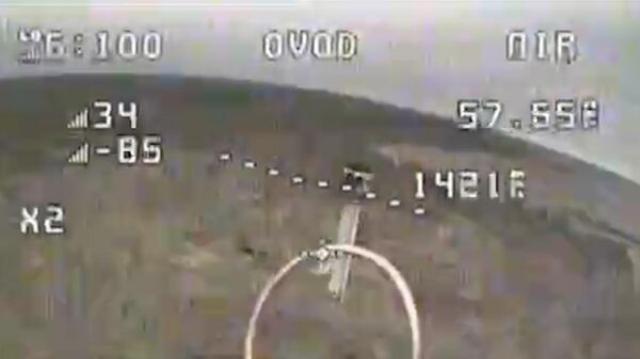It follows from the patent of the United Aircraft Corporation that the air launch UAV will be able to autonomously search and make a decision about hitting a target
MOSCOW, April 18. /tass/. The unmanned aerial vehicle (UAV), an air launch barrage munition, was developed for front-line aviation aircraft in Russia, follows from the patent of the United Aircraft Corporation, a copy of which is available to TASS.
"The unmanned aerial vehicle of the air launch is a barrage munition and is designed for single use <...> from standard aviation ejection devices of the AKU-58 type from external suspension points and from universal internal fuselage ejection devices of the UVKU-50 type from internal suspension points of front-line aircraft. A warhead is located inside the fuselage of the UAV. The unmanned aerial vehicle has a power plant, an optical system, navigation system sensors and an on-board intelligent search and guidance system based on trained neural networks," the document says.
It is clarified that the air launch UAV will be able to autonomously search and make a decision about hitting a target. "The onboard intelligent search and guidance system based on trained neural networks allows for autonomous search and independent decision-making to defeat targets, which allows the carrier aircraft not to enter the enemy's air defense zone, which ensures [its] safety and the use of UAVs at a considerable distance from the carrier aircraft," the developers explain.
About the tactics of using an air launch UAV
According to the patent, the drone can be equipped with various types of combat units: high-explosive charge, high-explosive fragmentation charge, high-explosive incendiary charge or shaped charge. "The possibility of placing various types of projectiles as a warhead of an unmanned aerial vehicle ensures the defeat of a wide range of targets. Thus, an unmanned aerial vehicle allows you to destroy armored and unarmored targets, causing maximum damage. The power plant of the unmanned aerial vehicle is represented by a single turbojet engine that provides flight at altitudes from 0 to 8 km and speeds corresponding to Mach numbers (M) from 0.11 to 0.6," the patent says.
According to the developers, the air launch UAV is characterized by high efficiency of hitting targets, is cheap and affordable for mass production.
According to the patent, the unmanned aerial vehicle is transported at the aircraft suspension point, it can be controlled both from a carrier playing the role of an air command post and from a mobile ground station, as well as completely autonomously.
"The launch of an unmanned aerial vehicle is carried out to the line of contact. Next, the UAV performs an autonomous flight along the route specified in the flight task using navigation system sensors. When entering a given target area, he starts searching along the route specified in the flight task or builds an independent optimal search route in a given target area. Camera data and information about detected and/or recognized targets are transmitted in real time to an aerial command post or a mobile ground control center," the patent says.
When a target is detected, the UAV either acts autonomously or receives external targeting from the operator from the air or from the ground. "In both cases, after switching to the "Attack" mode, the unmanned aerial vehicle autonomously forms a flight path to the target to defeat it. If the target is not found within the allotted time, then the unmanned aerial vehicle destroys the target with pre-known coordinates embedded in the flight task," the authors explain.

